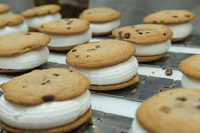The products
So what do these happy and healthy employees do all day? They assemble ice cream sandwiches; bake brownies, cake pieces and cheesecakes; extrude cookie dough; and develop new flavors and concepts for ice cream processors and foodservice accounts. Although Rhino Foods has a branded premium ice cream sandwich (Chessters), the company sees itself as a business-to-business supplier, either co-packing ice cream novelties and cheesecakes for others or selling baked and extruded inclusions.
“We’re a niche manufacturer,” Castle said. “We are good at co-packing, R&D and production.” He adds that food safety is a core competency.
Castle and Rhino Foods worked at being good. After playing professional hockey and coaching a college team, Castle and his wife owned an ice cream store in a mall. They soon learned that there is little demand for ice cream in the winter. He turned to wholesaling ice cream sandwiches from his car. He named the premium frozen custard sandwich Chessters for his Chesapeake retriever.
Castle moved Rhino Foods into a 2,000-square-foot plant when it developed a ready-to-bake cookie dough batter for Ben & Jerry’s franchised scoop shops. Castle was in Ben & Jerry’s research and development lab when Ben Cohen and Jerry Greenfield said they wanted to put cookie dough into pints. It wasn’t as simple as using the ready-to-bake (also known as “bake off”) version. As dough went through the fruit feeder, it was gooey, chewy and “made a mess,” Castle recalled. Eventually Rhino Foods and Ben & Jerry’s figured out the recipe for use in packaged ice cream. This “ready-to-eat” version uses pasteurized ingredients but it is not baked.
Ben & Jerry’s took pints to Boston and gave them away on Tax Day. The ice cream was an immediate success. Rhino Foods’ weekly production quickly grew from 200 cases to 1,600. After four months, it added a line, knocked down a wall and expanded. It was making cookie dough as fast as it could and Castle was turning down requests from other processors. After four years of selling the inclusion exclusively to Ben & Jerry’s, Rhino Foods offered it to other ice cream processors. By then it had moved to new offices in an industrial park in Burlington (see related article on page 54).
Rhino Foods was now the recognized worldwide leader in cookie dough and considered to be an expert in ice cream flavor trends, Castle said. Customers were telling him that they wanted to give Rhino Foods more of their business and they encouraged the company to make baked inclusions, Castle said.
So Rhino Foods bought mixers, ovens and other baking equipment. Typical of the company’s approach, it looked at the process of baking and made improvements as it went along. For example, the company learned how to de-pan brownies to minimize waste.
“We got to be a good baker,” Castle said. “It used to be high scrap, low throughput. It’s more continuous now.”
Rhino now specializes in developing customized baked inclusions to meet the individual needs of its customers. It became a good cheesecake maker, too. Rhino Foods used to produce a Weight Watchers product for H.J. Heinz. Recently it developed a one-bite, single-serve cheesecake product that meets the demand for portion-controlled foods. Castle sees this product as a growth opportunity and ideal for convenience-store retailers and foodservice operators.
The products
So what do these happy and healthy employees do all day? They assemble ice cream sandwiches; bake brownies, cake pieces and cheesecakes; extrude cookie dough; and develop new flavors and concepts for ice cream processors and foodservice accounts. Although Rhino Foods has a branded premium ice cream sandwich (Chessters), the company sees itself as a business-to-business supplier, either co-packing ice cream novelties and cheesecakes for others or selling baked and extruded inclusions.
“We’re a niche manufacturer,” Castle said. “We are good at co-packing, R&D and production.” He adds that food safety is a core competency.
Castle and Rhino Foods worked at being good. After playing professional hockey and coaching a college team, Castle and his wife owned an ice cream store in a mall. They soon learned that there is little demand for ice cream in the winter. He turned to wholesaling ice cream sandwiches from his car. He named the premium frozen custard sandwich Chessters for his Chesapeake retriever.
Castle moved Rhino Foods into a 2,000-square-foot plant when it developed a ready-to-bake cookie dough batter for Ben & Jerry’s franchised scoop shops. Castle was in Ben & Jerry’s research and development lab when Ben Cohen and Jerry Greenfield said they wanted to put cookie dough into pints. It wasn’t as simple as using the ready-to-bake (also known as “bake off”) version. As dough went through the fruit feeder, it was gooey, chewy and “made a mess,” Castle recalled. Eventually Rhino Foods and Ben & Jerry’s figured out the recipe for use in packaged ice cream. This “ready-to-eat” version uses pasteurized ingredients but it is not baked.
Ben & Jerry’s took pints to Boston and gave them away on Tax Day. The ice cream was an immediate success. Rhino Foods’ weekly production quickly grew from 200 cases to 1,600. After four months, it added a line, knocked down a wall and expanded. It was making cookie dough as fast as it could and Castle was turning down requests from other processors. After four years of selling the inclusion exclusively to Ben & Jerry’s, Rhino Foods offered it to other ice cream processors. By then it had moved to new offices in an industrial park in Burlington (see related article on page 54).
Rhino Foods was now the recognized worldwide leader in cookie dough and considered to be an expert in ice cream flavor trends, Castle said. Customers were telling him that they wanted to give Rhino Foods more of their business and they encouraged the company to make baked inclusions, Castle said.
So Rhino Foods bought mixers, ovens and other baking equipment. Typical of the company’s approach, it looked at the process of baking and made improvements as it went along. For example, the company learned how to de-pan brownies to minimize waste.
“We got to be a good baker,” Castle said. “It used to be high scrap, low throughput. It’s more continuous now.”
Rhino now specializes in developing customized baked inclusions to meet the individual needs of its customers. It became a good cheesecake maker, too. Rhino Foods used to produce a Weight Watchers product for H.J. Heinz. Recently it developed a one-bite, single-serve cheesecake product that meets the demand for portion-controlled foods. Castle sees this product as a growth opportunity and ideal for convenience-store retailers and foodservice operators.












